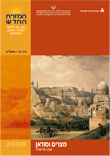The Decline of the West in Arab-Muslim Thought:
Three Reincarnations of a Prophecy
Uriya Shavit
The idea that the West is declining, that it is soon to collapse and that Islam will replace it in leading humankind finds much resonance in contemporary Islamist and Wahhabi writings. It is especially prevalent in the writings of Islamist scholars who have lived in the West or have closely witnessed its military and political power. By prophesizing that the West will inevitably fall, Islamists resolve some grave challenges: Their prophecy offers an explanation for the supremacy of the infidels, as it guarantees that the inferiority of the believers is temporary only. Their prophecy also satisfies the contradiction between tradition and modernity, which Islamist writings have struggled and failed to resolve since the late 19th century by promising that Muslims will, in the near future, be able to enjoy Western technological advancements without having to fear the corrupting values attributed to the applications of some of these advancements.
This article examines three reincarnations of this prophecy. Sayyid Qutb, a paramount figure in the evolution of contemporary radical movements which use violence in the name of Islam, spent the years 1948-1950 in the United States on behalf of Egypt's education ministry. There he reached the conclusion that America is a primitive, violent, superficial and materialistic society. This conclusion was to later echo in many of the works he published until his execution in 1966, in which he suggested that the West had nothing to offer humankind and only Islam could save it from its agonies. His approach deeply influenced other writers, in part due to the mediation of his brother Muhammad.
Another reincarnation discussed is that of Saudi academics, who in the beginning of the 1990s, at a time when the United States championed a "New World Order," prophesized in numerous essays that Western democracy had reached a dead impasse and that America would follow the Soviet's lead and collapse. In this article, the political and social functions such essays served are analyzed.
The third reincarnation discussed is the one which appears in books and sermons directed at or written by Muslims in the West. Here, the prophecy meets two objectives. First, the decline of the West suggests a diminished threat to the Muslim identity of migrants, and thus helps legitimize their living among the infidels. Second, the decline-prophesies involve depicting Muslim migrants as envoys of the true faith sent to the West to fill a spiritual void and to assist Islam in rising upon the West's collapse. Thus, such prophecies allow Muslims who migrated for financial motivations, and are often marginalized in Western societies, a sense of pride and mission.


